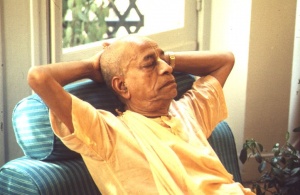CC Antya 17.46: Difference between revisions
m (1 revision(s)) |
No edit summary |
||
| Line 1: | Line 1: | ||
{{ | [[Category:Sri Caitanya-caritamrta - Antya-lila Chapter 17|C046]] | ||
<div style="float:left">'''[[Sri Caitanya-caritamrta|Śrī Caitanya-caritāmṛta]] - [[CC Antya|Antya-līlā]] - [[CC Antya 17|Chapter 17: The Bodily Transformations of Lord Śrī Caitanya Mahāprabhu]]'''</div> | |||
<div style="float:right">[[File:Go-previous.png|link=CC Antya 17.45|Antya-līlā 17.45]] '''[[CC Antya 17.45|Antya-līlā 17.45]] - [[CC Antya 17.47|Antya-līlā 17.47]]''' [[File:Go-next.png|link=CC Antya 17.47|Antya-līlā 17.47]]</div> | |||
{{CompareVersions|CC|Antya 17.46|CC 1975|CC 1996}} | |||
{{RandomImage}} | |||
==== TEXT 46 ==== | ==== TEXT 46 ==== | ||
<div | <div class="verse"> | ||
yebā veṇu-kala-dhvani, eka-bāra tāhā | :yebā veṇu-kala-dhvani, eka-bāra tāhā śuni', | ||
jagan-nārī-citta āulāya | :jagan-nārī-citta āulāya | ||
nīvi-bandha paḍe | :nīvi-bandha paḍe khasi', vinā-mūle haya dāsī, | ||
bāulī hañā kṛṣṇa-pāśe dhāya | :bāulī hañā kṛṣṇa-pāśe dhāya | ||
</div> | </div> | ||
| Line 14: | Line 18: | ||
==== SYNONYMS ==== | ==== SYNONYMS ==== | ||
<div | <div class="synonyms"> | ||
''yebā''—whoever; ''veṇu''—of the flute; ''kala-dhvani''—the sweet vibration; ''eka-bāra''—once; ''tāhā''—that; ''śuni'''—hearing; ''jagat''—of the universe; ''nārī''—of the women; ''citta''—hearts; ''āulāya''—become disturbed; ''nīvi-bandha''—the fastened belts; ''paḍe''—fall; ''khasi''’—becoming loosened; ''vinā-mūle''—without a price; ''haya''—they become; ''dāsī''—maidservants; ''bāulī''—mad; ''hañā''—becoming; ''kṛṣṇa-pāśe''—after Kṛṣṇa; ''dhāya''—run. | |||
</div> | </div> | ||
| Line 21: | Line 25: | ||
==== TRANSLATION ==== | ==== TRANSLATION ==== | ||
<div | <div class="translation"> | ||
"The transcendental vibration of Kṛṣṇa's flute disturbs the hearts of women all over the world, even if they hear it only once. Thus their fastened belts become loose, and these women become the unpaid maidservants of Kṛṣṇa. Indeed, they run toward Kṛṣṇa exactly like madwomen. | |||
</div> | </div> | ||
__NOTOC__ | |||
<div style="float:right; clear:both;">[[File:Go-previous.png|link=CC Antya 17.45|Antya-līlā 17.45]] '''[[CC Antya 17.45|Antya-līlā 17.45]] - [[CC Antya 17.47|Antya-līlā 17.47]]''' [[File:Go-next.png|link=CC Antya 17.47|Antya-līlā 17.47]]</div> | |||
__NOTOC__ | |||
__NOEDITSECTION__ | |||
Revision as of 12:02, 24 September 2021

A.C. Bhaktivedanta Swami Prabhupada
TEXT 46
- yebā veṇu-kala-dhvani, eka-bāra tāhā śuni',
- jagan-nārī-citta āulāya
- nīvi-bandha paḍe khasi', vinā-mūle haya dāsī,
- bāulī hañā kṛṣṇa-pāśe dhāya
SYNONYMS
yebā—whoever; veṇu—of the flute; kala-dhvani—the sweet vibration; eka-bāra—once; tāhā—that; śuni'—hearing; jagat—of the universe; nārī—of the women; citta—hearts; āulāya—become disturbed; nīvi-bandha—the fastened belts; paḍe—fall; khasi’—becoming loosened; vinā-mūle—without a price; haya—they become; dāsī—maidservants; bāulī—mad; hañā—becoming; kṛṣṇa-pāśe—after Kṛṣṇa; dhāya—run.
TRANSLATION
"The transcendental vibration of Kṛṣṇa's flute disturbs the hearts of women all over the world, even if they hear it only once. Thus their fastened belts become loose, and these women become the unpaid maidservants of Kṛṣṇa. Indeed, they run toward Kṛṣṇa exactly like madwomen.